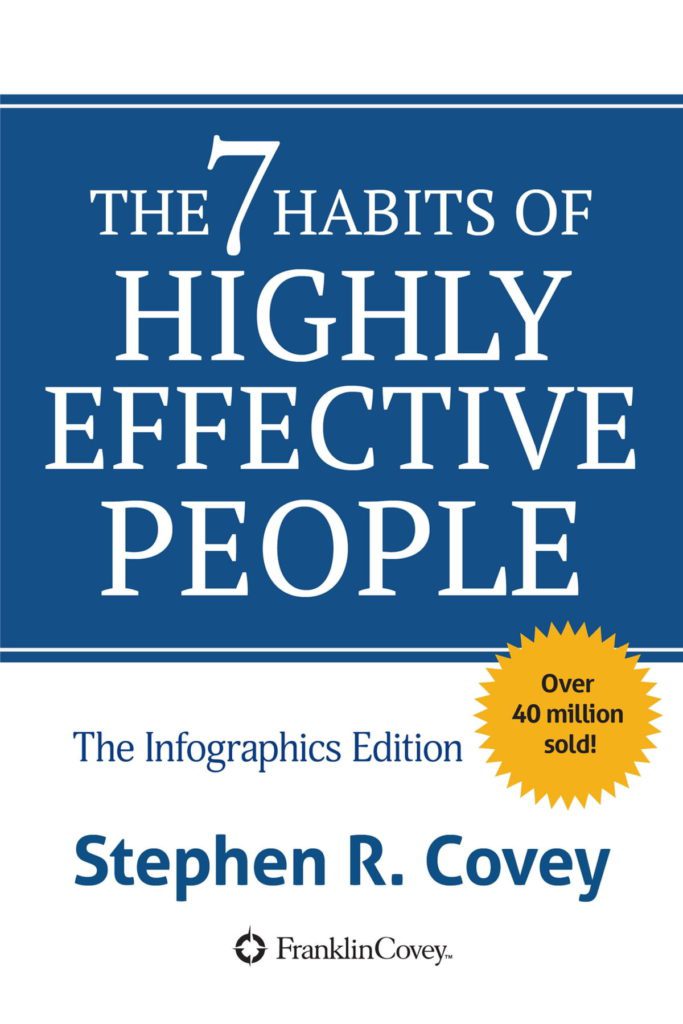
Welcome to the journey of transforming your life with Stephen Covey’s 7 Habits!
The 7 Habits of Highly Effective People: Powerful Lessons in Personal Change is a timeless classic that has impacted millions of lives around the world, including my own. If you’re looking for a roadmap to achieve greater success, happiness, and fulfillment, you’ve come to the right place.
In this summary, you’ll discover how Covey’s principles can help you become the person you want to be and live the life you’ve always dreamed of.
So, are you ready to take control of your life and unleash your full potential?
Let’s get started!
Habit #1: Be Proactive
The first step in Stephen Covey’s 7 Habits is to become proactive. This means you must take control of your life and choose to act with purpose and intention, rather than simply reacting to external circumstances. By embracing a proactive mindset, you can create the life you want and achieve your goals, both personal and professional.
In the book, Covey asks you to imagine your own funeral and think about what you want to be remembered for. This powerful exercise can help you assess whether you are living in alignment with your values and goals, and can inspire you to make changes and take action to live a more fulfilling life.
Take Control of Your Life with Proactivity
Are you ready to take control of your life and make a positive impact?
Here’s how to get started:
- Reflect on your values and goals: Take some time to think about what you want to be remembered for, and make a list of your most important values and goals.
- Assess your habits: Consider how your current habits and behaviors align with your values and goals. Are there any areas where you need to adjust to live in accordance with what you want to be remembered for?
- Create a plan: Make a plan to make the changes you need to live a more fulfilling life and start taking small steps towards your goals.
Habit #2: Start with Your Destination in Mind
Starting with the end in mind means you should have a clear vision of what you want to achieve and align your actions to work towards that vision.
Many of us have a clear idea of what matters most to us in life, such as our well-being, relationships with family and loved ones, and other priorities. However, it’s common to spend more time on less important tasks and neglect the things that truly matter to you.
By starting with the end in mind and setting clear goals, you can bridge the gap between what you say is important and how you actually spend your time.
By focusing on our destination, you can also make better use of your time and resources and work towards your long-term goals. This habit helps you prioritize your efforts and ensures that you are living a life that is consistent with what truly matters.
Habit #3: Put First Things First
In order to achieve success and effectiveness, Stephen Covey emphasizes the importance of effective time management as the third habit of highly effective people.
This habit involves prioritizing tasks based on their significance and importance, rather than letting the less important tasks consume too much of your time and energy.
To implement this habit, use the “4 Quadrants of Time Management” outlined in Stephen Covey’s book. This model categorizes tasks into four categories based on their level of importance and urgency, which helps prioritize the tasks and make the best use of your time.
4 Quadrants of Time Management

The “4 Quadrants of Time Management” model helps you categorize tasks based on their level of importance and urgency. Here’s a breakdown of the four categories:
- Urgent and Important: These tasks are both urgent and essential and should be addressed immediately. Examples include attending an emergency, meeting a deadline, or handling a crisis.
- Not Urgent but Important: These tasks are important, but not urgent. Prioritize these tasks to achieve your long-term goals. Examples include planning, goal setting, and relationship building.
- Urgent but Not Important: These tasks may be pressing, but they are not important. Minimize or delegate these tasks. Examples include unnecessary meetings, interruptions, and reacting to other people’s agendas.
- Not Urgent and Not Important: These tasks are neither urgent nor important. Try to avoid them. Examples include watching TV, playing video games, or engaging in other forms of entertainment.
Habit #4: Think Win-Win
This means you should approach situations with the goal of finding mutually beneficial solutions instead of approaching them as a competition where one person wins and the other loses.
The Importance of Win-Win Thinking
Thinking win-win helps build strong, positive relationships with others and fosters a sense of cooperation and mutual benefit. It’s crucial to focus on finding solutions that work for everyone involved in a situation instead of just trying to win at the expense of others.
Exercise
Here’s an exercise you can do to practice this habit:
- Identify a situation where you’re in conflict or need to negotiate a solution that benefits both parties.
- Consider the goals and needs of each person involved. Ask yourself, “What are we each trying to achieve, and what are our underlying concerns or motivations?”
- Look for potential solutions that can meet the needs of both parties. Can you find a way to address everyone’s concerns and create a mutually beneficial outcome?
- Communicate with the other person and try to reach a win-win solution. Keep in mind their needs and goals, and don’t focus on winning at their expense.
- Reflect on the outcome of the situation. Did you find a solution that worked for both parties, and how did this approach compare to more competitive or zero-sum approaches? What did you learn from this experience about the value of thinking win-win?
Habit #5: Seek First to Understand, Then to be Understood
The key to the fifth habit is empathy. You need to understand others’ perspectives and needs before trying to persuade them to see things your way. This doesn’t mean giving up our own opinions or goals, but rather taking the time to truly understand where the other person is coming from.
Think of it like a ladder. Imagine that you and someone else are trying to reach apples on a tree. Individually, you both can’t reach the fruit. But by standing on each other’s shoulders, you can both get what you want.
By understanding and working with each other, the whole becomes greater than the sum of its parts.
Applying the “5 Whys” Technique
When you want to solve a problem, the “5 Whys” method can help. Simply ask “why” five times to get to the root cause of the issue.
Here’s an example:
Let’s say a machine in a factory keeps breaking down.
First, ask “Why is the machine breaking down?” The answer could be “Because it’s overheating.”
Next, ask “Why is it overheating?” The answer could be “Because the cooling system isn’t working well.”
Keep asking “why” until you find the root cause of the problem.
Exercise
- Think of a situation where you had a disagreement with someone else.
- Try to understand the other person’s perspective and needs. What were they trying to achieve and what were their underlying motivations?
- Practice active listening and ask questions to better understand the other person’s point of view.
- Apply the “5 Whys” technique if necessary to identify the root cause of the issue.
- See if you can find a solution that meets both parties’ needs and goals. Remember to focus on understanding before being understood.
- Reflect on the outcome of the situation. Did you find a solution that worked for both parties? What did you learn from this experience about the power of seeking to understand before being understood?
Habit #6: Work Together, Win Together
The sixth habit in Stephen Covey’s book “The 7 Habits of Highly Effective People” is about working together with others. This means you should find ways to join forces with others to create solutions that benefit everyone involved.
Picture this:
There’s a man trying to chop down a tree with a saw. His neighbor sees him struggling and suggests he sharpen the saw. The man thinks it will take too long and brushes off the suggestion. This is an example of missing out on small investments that can lead to big results.
By seeking out opportunities to work with others and find mutually beneficial solutions, we can accomplish much more than we could alone. This habit encourages you to embrace collaboration and work towards common goals with others.
Habit #7: Sharpen the Saw
Self-care and balance are key components of the seventh habit, “Sharpening the Saw”.
This habit encourages you to take care of yourself and maintain balance in FOUR important areas:
- Physical
- Social/emotional
- Mental
- Spiritual.
Think of a saw that’s used non-stop to cut down trees. Over time, the blade becomes dull and the saw becomes less effective. In the same way, you need to regularly care for yourself to keep your life balanced and functioning at its best.
Investing in your well-being is crucial to sharpening the saw. This includes activities like exercising, eating a healthy diet, spending time with loved ones, challenging your mind through learning, and engaging in spiritual or personal growth practices. By prioritizing self-care, you can maintain balance and become more effective in all areas of your life.
So, take a moment to reflect on the four important areas of your life and think about what you can do to sharpen the saw. Whether it’s going for a walk, taking a yoga class, reading a book, or simply spending quality time with loved ones, make a commitment to invest in your well-being.
You’ll be amazed at the positive impact it can have on your life.
Conclusion
In conclusion, Stephen Covey’s “The 7 Habits of Highly Effective People” offers practical and timeless wisdom for anyone seeking to transform their lives and become more effective in their personal and professional lives.
The habits are NOT just about achieving more, but about becoming the best version of ourselves. By putting these habits into practice, we can improve our relationships, achieve our goals, and lead more fulfilling life.
We can all benefit from regularly reflecting on and applying the principles outlined in this book.

